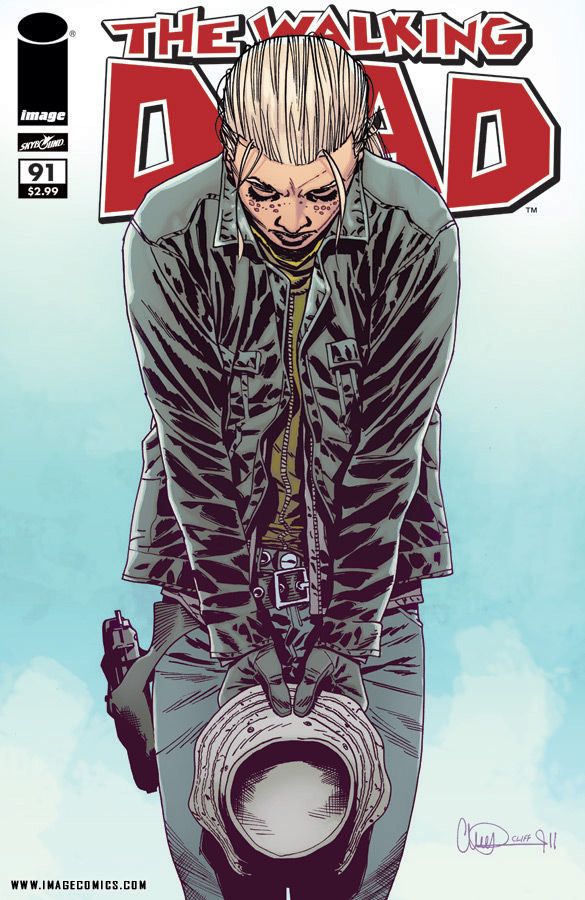"The Walking Dead" #91 is filled with little character moments, as Robert Kirkman looks to settle the cast down just a bit and deal with some of the larger issues the series has ignored. While the issue doesn't have a single plot line driving through it, long time readers will appreciate the smaller moments. In the end, Kirkman throws in a two page tease to hint at what's coming up next for the series. There's not enough there to get excited about just yet, but it's nice to know that there's something coming, aside from the daily grind of killing zombies, gathering food, and trying to remain civil to each other.
The one question amongst "Walking Dead" fans that Kirkman is starting to face head-on with this issue is the canned foods issue. The series is old enough now that the finite food supply (A) has to be running out and (B) should be expiring soon. Canned food lasts a long time and all, but cans sitting on shelves for two years or more have to be problematic. It's a topic of conversation for Rick and his "chiefs" to run down, as the political issues necessary in creating a viable farming system in the walled-off compound have to be addressed. Will "The Walking Dead" become a political series next at the most basic level, or will these conversations just serve to create new tensions to be released at the edge of a knife to another nameless zombie? It's a central issue with the series now, as the cast seems set to stay put in one place. Without the running for their lives, can the series maintain its excitement beyond just finding new ways to invite a mob of un-dead and then kill them? As Kirkman personalizes the angles on the politics with known characters and their known tensions, the book is on the right path.
We see more than just that, of course, as Rick and Andrea address their recent dalliance, and Carl talks to Sophia about his disfigurement in kids terms, while he confronts it more directly with his father. Andrea steals the issue in a two page scene with parallels to Rick's conversations with his dead wife over an unplugged phone. She shows how hung up she is on Dale with his hat, but the conclusion is a classic left turn that will make you laugh and perhaps cheer at the same time.
Charlie Adlard and Cliff Rathburn continue to sell the stories in a straight forward manner. There's nothing flashy going on here. There are no intricate layouts or trendy storytelling choices. It's relentless panel grid after panel grid, mostly three tiers to a page. No diagonals, nothing rounded off, no fancy computerized effects. It's a wonderfully organic look and feel, with some line work that feels more solid than some of the recent issues.
This isn't a stand out issue for the series. Aside from Andrea's hat scene, it's a series of scenes that set some things up and let us take a look in at the present situation, but there's nothing to make you jump up and cheer or scream for the next issue. You can't have that every issue, I know, but I was hoping for something to get the blood pressure rising a little bit at some point. Even the tease at the end is just a shadowy figure looking through binoculars. There's not much there.
But that's "The Walking Dead," the very definition of a roller coaster ride. This is one of those issues that will fit in well with a collection down the ride. As a singular monthly issue, it's complete but not spectacular. But it's still the single monthly series I look forward to the most.

